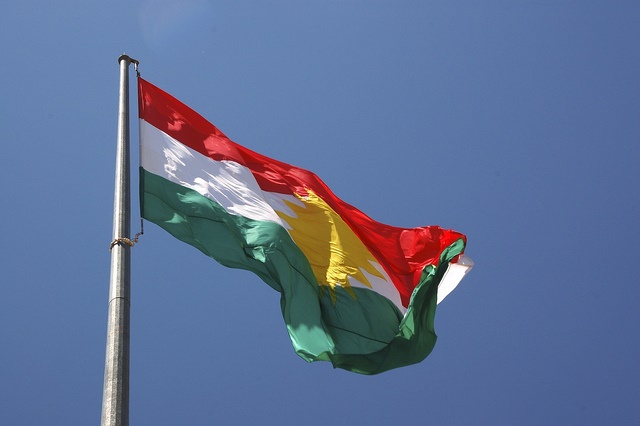 Peter Leahy at the recent launch of his Strategic Insights paper Another century, another long war highlighted, as I have in previous posts, the critical need for a regional political strategy to support operations currently underway against ISIS in Syria and Iraq. The complicating factor, of course, isn’t just what that strategy is, but who should design it and lead its execution.
Peter Leahy at the recent launch of his Strategic Insights paper Another century, another long war highlighted, as I have in previous posts, the critical need for a regional political strategy to support operations currently underway against ISIS in Syria and Iraq. The complicating factor, of course, isn’t just what that strategy is, but who should design it and lead its execution.
In discussing the absence of a natural leader in a recent blog post, I rhetorically suggested that the UN Secretary General should step up to the job. But while it’s a central role for the Secretary General, it’s highly unlikely the current incumbent could undertake it.
I also suggested that in the absence of a political strategy there’d be a range of implications for the region that would be increasingly difficult to manage and would continue to undermine the fight against ISIS. Three of those are now unfolding. First is the future place of the Kurds in the region, second Assad’s ongoing position in Syria, and third the continued stress on the political structure of Iraq.
How to reward the Kurds? Some have dismissed the current fight in Kobane as just a single battle in a long war—but win or lose, that misses the point. To the Kurds of Syria and Turkey it has become ‘a defining moment of nationhood and identity’—a point reinforced recently by Iraq’s former Foreign Minister Hoshyar Zebari. Kurdish claims for nationhood have been enhanced, particularly after the US provided materiel support and pressed Turkey to open its border to the Iraqi Kurds to enable them to reinforce their brothers and sisters in Kobane.
While the Kurds’ aspirations are yet to unfold, it’ll be interesting to watch three indicators of a maturing unity among the Kurds:
- they resist the temptation to re-start violence in Turkey (thus allowing the international community to build pressure on Turkey);
- they continue to behave in ways that reinforce the perception of a united Kurdish people; and
- they refuse to shift their focus from ISIS to the Assad regime.
Notwithstanding those moves, a solution to Kurdish nationalism needs to be addressed urgently.
Let’s turn to Syria. A lack of strategic pragmatism has provided much-needed oxygen to the Assad regime. In a recent interview the President of the International Crisis Group summed up the situation when he observed that the Assad regime had proven to be more resilient than many people had thought. As a consequence the only good outcome in Syria would be a negotiated peace—which would require a process of de-escalation at the regional level.
De-escalation’s also important as a buffer for Israel. The region can’t wait for the 2016 US presidential election for any change in the US strategy in Syria. A failed Syria and ungovernable areas along the Golan Heights have the potential to draw Israel into the conflict. The US needs—urgently—to change its strategy in Syria.
And so to Iraq. While the new government’s taken some tentative steps toward a more inclusive approach I suspect events have already passed it by. The Kurds, taking their destiny into their own hands, have effectively heralded the break-up of Iraq. The further legitimisation of Iraqi Kurdistan coupled with the experience of Kobane will in all likelihood draw the Turkish and Syrian Kurds to it. The consequence of that—if not well managed—will be an increasing momentum to further divide the Sunni and Shia communities; and the real beneficiaries of that would be ISIS and Iran.
So, what to do? There’s no perfect outcome; it’s just a matter of making the best of what’s available—a sort of ‘Middle Eastern’ pragmatism. The first step should be the development of a deliberate plan to de-escalate the situation in Syria. To support that de-escalation a regional political architecture needs to be found that can provide a framework around which a flexible, issue-based approach can be developed—starting with Kurdish nationalism. Iraq will then have the start of a regional political process that’ll provide it with some chance to manage Iran, rebuild its nation and address ISIS.
Idealistic? Maybe—but there’s a growing optimism around the next steps in the P5+1 process currently being used to manage the Iranian nuclear issue. That may offer a regional architecture within which broader regional issues can at least be introduced.
Broadly there are three groups within the P5+1 that have some chance of reducing the political heat while building confidence. The Russian/Iranian group has some influence in Iraq and Syria; the US/UK/France group has connections to the Gulf States, Turkey (albeit problematic) and Israel; and the third group will involve what I would loosely describe as the outliers, China and Germany. Working in isolation none of those groups has sufficient influence to overcome deep-seated self-interest or to move forward on substantive issues. But working pragmatically across the groups may set the region on a course that offers some chance of addressing the big issues.
Now, who’s going to kick-start the process? The US has a key role, but domestic politics will continue to get in the way. The Secretary General’s unlikely to lead from the front. To improve the chance of success it’s time for the non-permanent members of the Security Council to take the lead and start shaping the political strategy. For the next few months, that includes us.
Michael Clifford is a senior fellow at ASPI. Image courtesy of Flickr user Chris De Bruyn.

